Key takeaways:
- Critical thinking enhances comprehension and appreciation of classical literature by allowing for deeper analysis of characters and themes.
- Employing techniques like the Socratic method, thematic mapping, and comparative analysis can reveal richer interpretations of texts.
- Discussions about literature foster diverse perspectives and connections to contemporary issues, enriching understanding and critical thought.
- Personal experiences shared in literary discussions can transform engagement with texts and illuminate characters’ motivations.
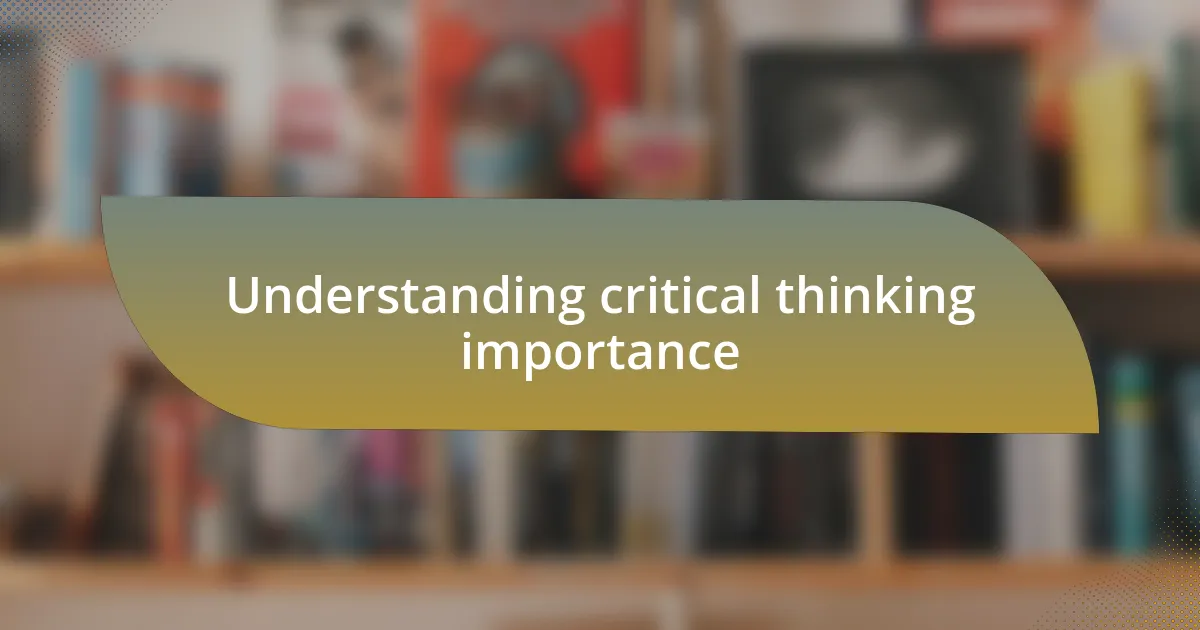
Understanding critical thinking importance
Critical thinking is the backbone of intellectual engagement, especially in the realm of classical literature. I remember the moment I first dissected a complex character in a Shakespearean play; it was exhilarating to uncover layers of motivation and context. This experience made me realize that critical thinking not only enhances comprehension but also enriches our appreciation for the text.
When we grasp the importance of critical thinking, we unlock the ability to question the motives behind the characters’ actions. Have you ever considered how an author’s choices reflect societal values? It’s fascinating to explore how a critical lens can reveal underlying themes that resonate with our own experiences and emotions, deepening our connection to the narrative.
Moreover, developing critical thinking prepares us for real-world challenges. I often reflect on discussions with fellow literature enthusiasts, where we debated the implications of a story’s ending. These conversations sharpen our analytical skills and encourage us to articulate our thoughts clearly—valuable tools for navigating the complexities of life itself.
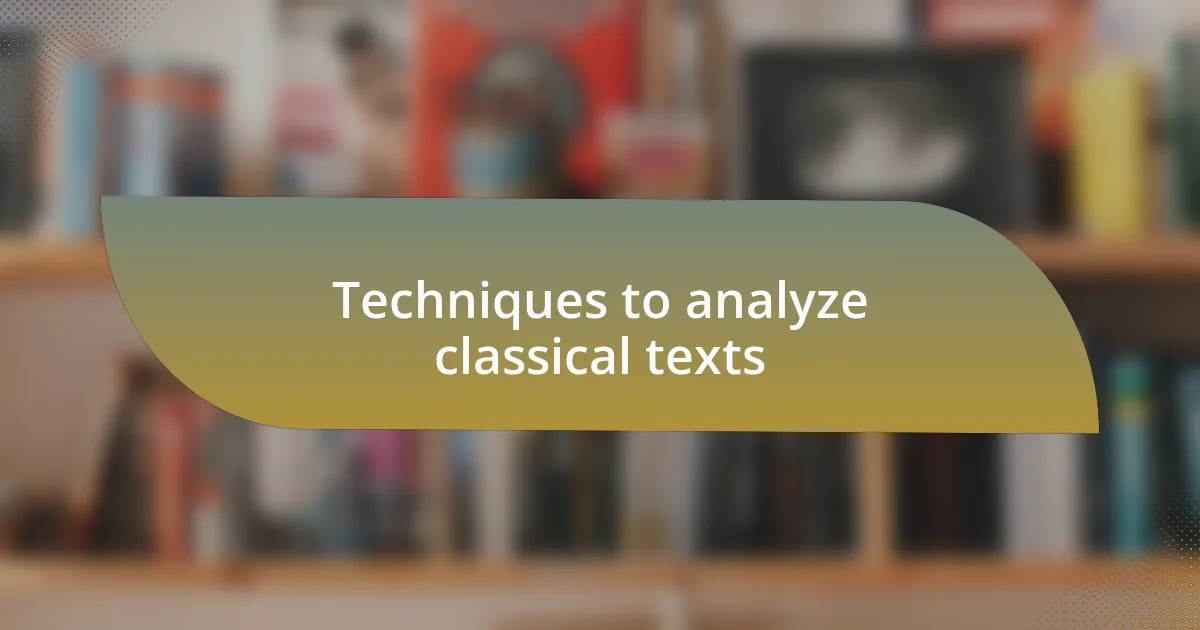
Techniques to analyze classical texts
To effectively analyze classical texts, I suggest employing the Socratic method. This technique involves asking probing questions, much like I did during a seminar on Aristotle’s “Poetics.” I found that by challenging assumptions and exploring various interpretations, my classmates and I could unearth deeper meanings that might otherwise remain hidden. What questions have you asked about a text that changed your perspective?
Another approach is to create thematic maps. When I was studying “The Odyssey,” I began to visualize the central themes—heroism, homecoming, and identity—by writing them down and connecting quotes and events that exemplified each theme. This practice helped me see the narrative’s structure more clearly and understand how these themes intertwined. Have you ever mapped out your thoughts on a story? It can be a powerful way to solidify your insights.
Finally, engaging in comparative analysis can provide a fresh lens. I often found that juxtaposing two classical works reveals contrasts and parallels that stimulate richer discussions. For example, comparing Virgil’s “Aeneid” with Homer’s “Iliad” shed light on differing cultural values surrounding heroism and duty. What similarities and differences have you noticed in your readings? This technique not only enhances comprehension but also fosters a lively dialogue among literature lovers.
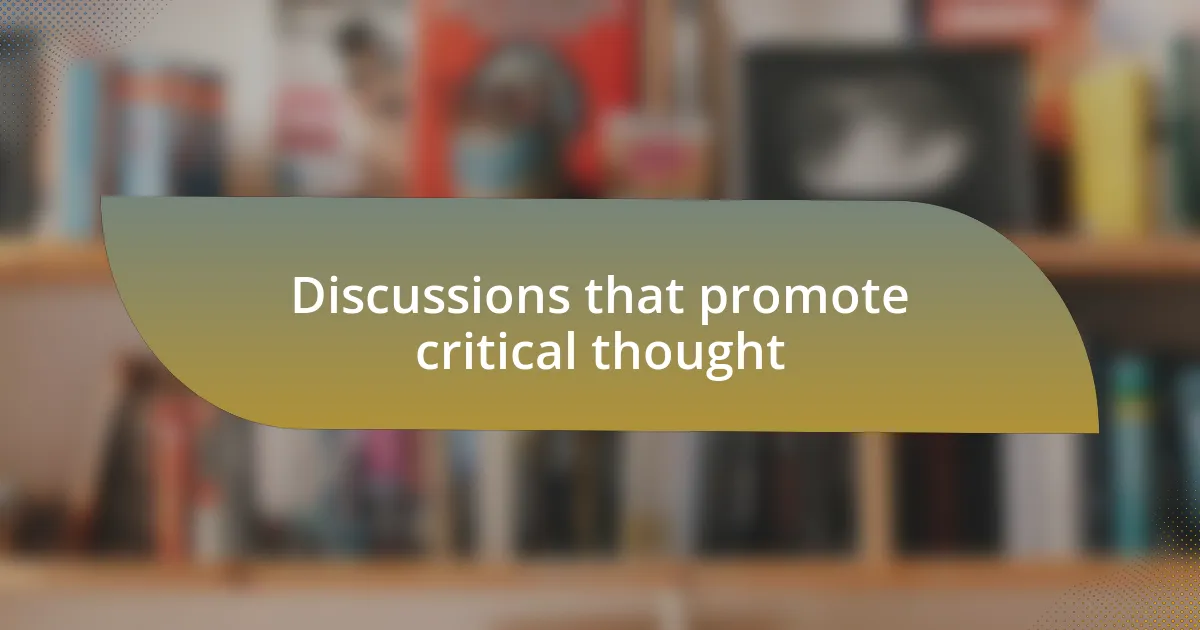
Discussions that promote critical thought
Engaging in discussions about classical literature often invites a wealth of perspectives that can significantly enhance critical thinking. I remember a spirited debate I had over Shakespeare’s “Macbeth” with fellow enthusiasts. We dissected Lady Macbeth’s ambition and guilt, and it was fascinating to see how different interpretations of her character led us to question broader themes of power and morality. Have you ever found yourself reevaluating a character’s motivations in such intense discussions?
Another vibrant discussion stemmed from exploring the historical context of works like “The Iliad.” When we examined how the values of ancient Greeks influenced the portrayal of war and honor, it opened up a floodgate of ideas about contemporary conflicts. I realized that connecting the past with the present not only deepens our understanding of the text but also enriches our worldview. What contemporary issues do you see reflected in classical works?
Sometimes, I find that role-playing scenes from plays can spark unexpected insights. Last month, during a small gathering, we acted out parts of “The Tempest,” and stepping into the shoes of Prospero and Caliban led to an animated exchange about power dynamics and colonialism. That experience reminded me of how literature invites us to question societal norms. Have you ever tried embodying a character, and how did it alter your perspective on the themes involved?
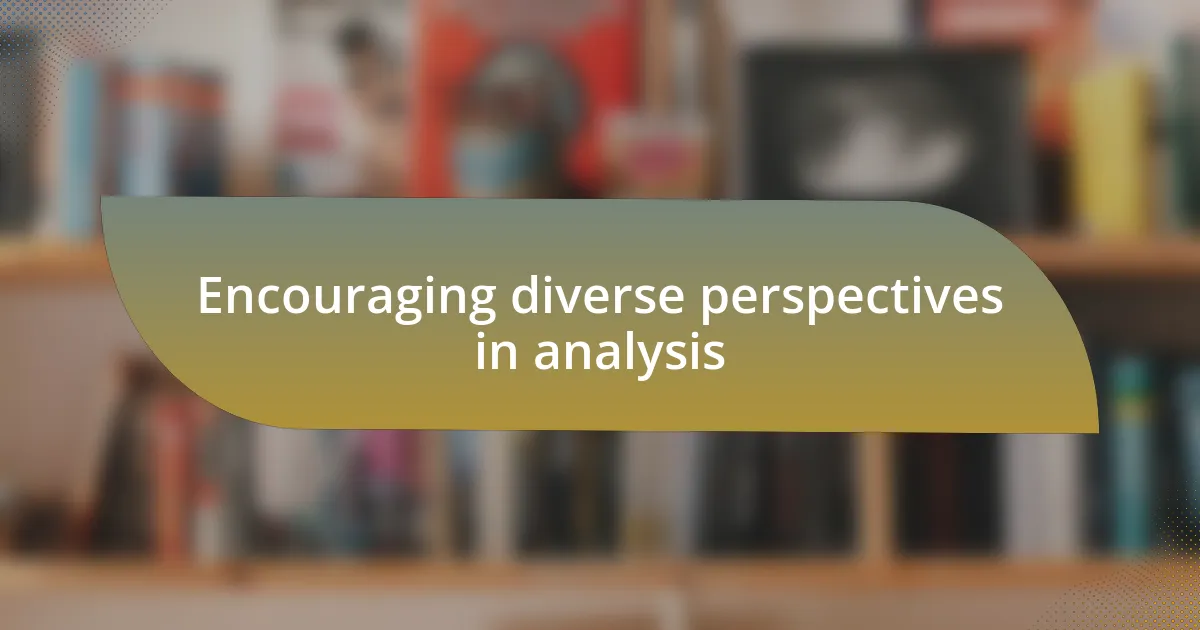
Encouraging diverse perspectives in analysis
To truly appreciate classical literature, embracing diverse perspectives in analysis is essential. I recall a discussion about Jane Austen’s ” and Prejudice” with a friend from a different cultural background. Their perspective on social class and gender expectations added depth to my understanding of the characters, making me reconsider my previously held notions about Elizabeth Bennet’s defiance. Have you ever encountered a viewpoint that completely shifted how you viewed a beloved character?
In a literature circle, I once suggested examining T.S. Eliot’s “The Waste Land” through the lens of mental health. This approach ignited a lively conversation about fragmentation and despair, as others shared their interpretations rooted in personal experiences. Listening to how the poem resonated differently with each participant brought a new layer to my own reading. How often do we allow our experiences and backgrounds to influence our interpretations?
I think facilitating group activities where participants analyze passages together can spark powerful insights. During one session, we tackled a complex poem by Homer, breaking down each line and sharing our thoughts in real-time. This collaborative effort not only illuminated diverse interpretations but also fostered a deeper empathy for the characters’ struggles. Can you recall a group analysis that enriched your understanding of a classic text?
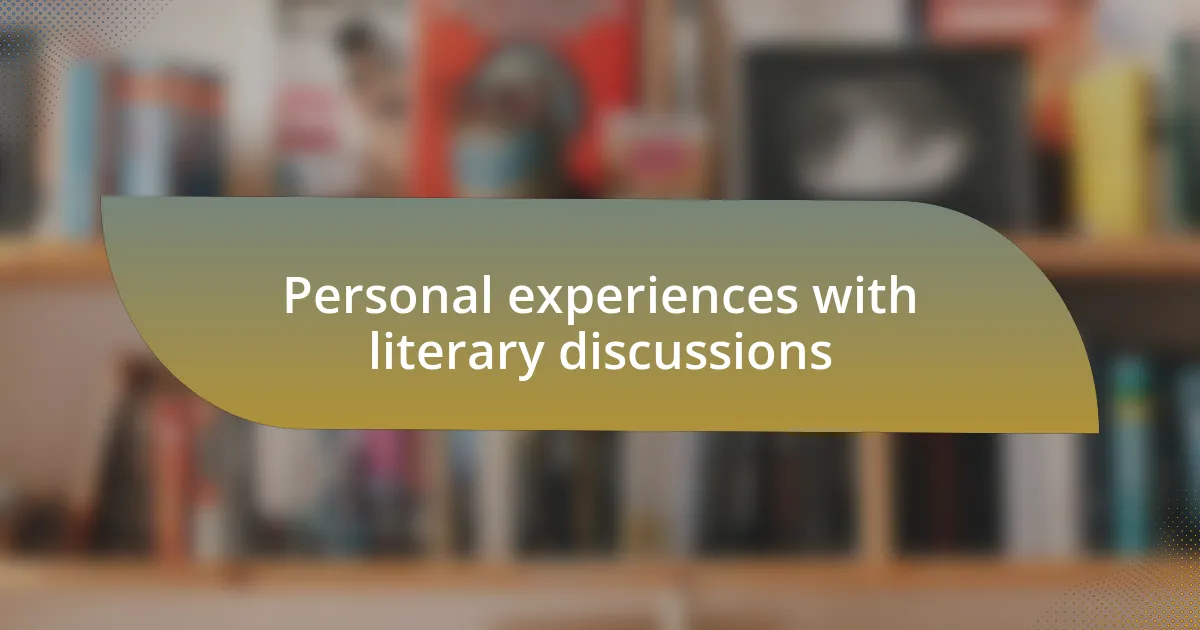
Personal experiences with literary discussions
Literary discussions have a unique way of revealing layers of meaning that I might not have discovered on my own. I remember sitting in a café with a mentor discussing Shakespeare’s “Hamlet.” My mentor’s deep dive into the psychological aspects of madness sent my thoughts racing. It was eye-opening to realize how my own experiences with loss and betrayal could parallel Hamlet’s struggles, shifting my engagement with the text entirely. Have you ever found that a conversation brought you closer to a character’s inner turmoil?
In another instance, I joined a local book club where we focused on Dickens’ “A Tale of Two Cities.” The members represented a wide age range, and hearing my peers discuss themes of sacrifice and redemption from their life experiences was invigorating. One member shared a story about a personal sacrifice that mirrored Sydney Carton’s journey, which brought a palpable emotional weight to our discussion. How often do our personal stories intertwine with the narratives we read?
I find that debating differing interpretations can be incredibly stimulating. During a session on F. Scott Fitzgerald’s “The Great Gatsby,” participants fiercely defended the characters’ motivations based on their own beliefs about wealth and morality. When I pushed back against my own interpretation of Gatsby’s dream, it led to a deeper exploration of the American Dream itself. Have you had moments where challenging your own viewpoint transformed your understanding of a story?